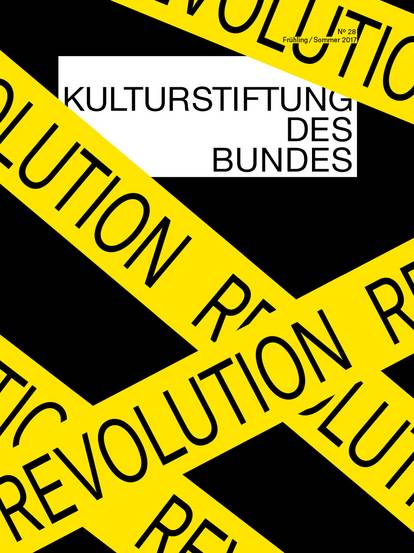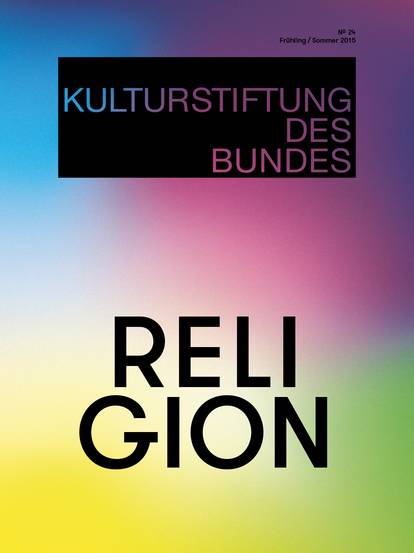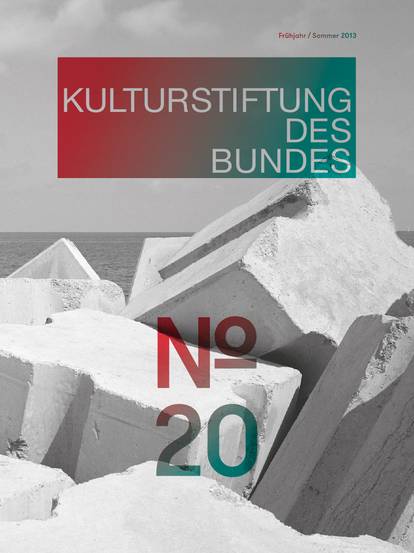The cultural and legal scholar Jedediah Purdy (JP) is a leading theorist on the climate crisis– and as such, is reluctant to embrace illusions. Only by making far-reaching changes to our lifestyle can Western democracies contribute to fairly distributing the resources on this planet. But of one thing he is confident: humans have reimagined their relationship to nature so often in the past – why should our power of imagination fail us now? An appeal for courage to engage in cultural change.
---
Mr. Purdy, right now many debates about the climate crisis seem to revolve around preserving and protecting nature. You argue that this aim is just wishful thinking and has little to do with our actual situation on the planet. To what extent do we have to rethink our ambitions?
JP An important factor in environmental politics is the notion that nature was once pure and untouched before we destroyed it. It’s a romanticised idea from a privileged perspective. Imagining such holistic harmony completely disregards the mutual dependence and competition for survival on this planet which has always played a predominant role. For humans, it’s always been about shaping our environment and gaining access to resources – and consequently, also the struggle for survival.
We can describe the relationship from a more technical angle. We’ve entered the Anthropocene, the era of humanity if you will, in which the entire living world is undergoing incessant change through human activity. For every one of us, there are about 2,000 metric tonnes of built and transformed environment. We should think about this environment, for that’s where the political tasks of our future lie. This constructed world of human laws, cities, transport networks and energy systems is one in which we must also forge justice for humans together with other species on this planet. All of these developments make certain people powerful and others vulnerable – whether it’s a local matter like building a new highway system or electricity grid, or global like changing the Earth’s atmosphere and global weather patterns.
What we think of as environmental policy is in fact a matter of responsibility. That’s what it boils down to, and we can no longer dispassionately describe who gets to live and who has to die in the 21st century.
Should we regard our so-called environmental policy as a new form of political morality?
JP The politics that address the human relationship to the living world are often tied to a hope for moral and cultural reform. These hopes play a major role in green politics nowadays and historically go back hundreds of years. I admire this type of politics which has enabled us to deal with the crises humans have caused. In this respect, the romantic view of nature was not just a mistake, it was also a productive creation. But I don’t think that the climate crisis will offer us an opportunity for moral restoration either. At least for the next decades we’re going to have to grapple with some harsh cutbacks to our accustomed lifestyle. No moral transformation can keep pace with our rapid sense of loss.
Then what should we focus on, if not on the ethical aspect of this crisis?
JP When people are forced to face the worsening climate crisis every day, they will also be forced to tell fundamentally new stories about nature and our lives within it. The ability to surmount future crises will also depend largely on the power of such storytelling. And to develop them, we’ll need – this is where it gets almost dialectical – powerful physical models from our real-world environment. A historic example of this is the starkly romanticised, but very generative politics of wilderness, of the wild in 20th-century America. Currently there are about 110 million acres (445,000 km2) of land that falls under the wilderness statute of 1964 and cannot be developed. The law has produced measurable ecological benefits. This protected status would have never come to pass if there hadn’t been such a high appreciation for national parks in the United States during these same decades. The national parks with their somewhat crude aesthetic connection to ideas of European romanticism, manifest destiny and republican patriotism became a productive, promising model for a new progressive public land policy. These types of images are what we need for our crisis management today.
What might such images look like?
JP If we want to steel our minds for current crises, we need more complex imagery than that of national parks which can make the otherwise abstract political relationships visible. A kind of world theatre. Food systems and our methods of global food production would be a fitting topic for this theatre. No one knows what kind of harm you’re involved in or the good you can do until you’ve understood the basic everyday metabolism of the world.
The pandemic also possesses such theatrical features. It functions like a diagnostic dye injected into the blood stream, or into a social system, and makes vulnerability in times of danger visible to the eye.
Do you believe that because of the abstract quality of crises, we don’t feel the fear necessary to take more meaningful action?
JP Thomas Hobbes believed that communities required political guidance due to their susceptibility to fear. And that we have to create institutions which help us manage this fear in a sensible manner – in other words, to help us respond appropriately to the real reasons and overcome our confused experience of fear. Fear can form a basis for collective action just as much as it can drive suspicion or cause us to retreat. Both processes always run parallel to one another. So I say ‘yes’ to fear! If we comprehend our fear correctly, it can sharpen our attention to what we care most about. But when we aren’t conscious of our fear, it can mislead us to see the world like the images of shadow theatre.
You’ve talked a lot about the delusional fears that have had a growing influence on American society in recent years. What agents or forces do you believe are best apt at countering these fears?
JP First off, I should say that my hopes are subdued because democratic contracts are no longer binding for up to 40 percent of the US population. I think this trend could also affect other Western countries in the coming years. If I had to bet on anything, then it would be the tangible achievements of a new realpolitik. For only this form of realpolitik can allow citizens to experience the positive possibilities of statehood, which was symbolically put up to debate in the “Big Lie” of the stolen election. The current administration knows that it has very little time to show as many citizens as possible how this country can continue functioning in periods of crisis. What we need now is a realistic fear of an authoritarian turn to advance governmental action and social innovation.
What would this innovation have to look like in the coming years?
JP Infrastructure projects and investments are important, the success of which are visible and motivating to all. The Green New Deal plays a decisive role in this respect because it takes the social dimension of the climate crisis into account. Another important aspect is the means of communicating about the crisis. This might sound crazy but politics at the national level should become more boring again. It should at best analyse concrete problems and inform people on pragmatic measures instead of celebrating the deep divisions of political partisanship. That would be a relief.
If communication during a crisis is so important, shouldn’t we openly discuss how inadequate numerous crisis management measures really are?
JP Innovation starts small, so does trust in government. Large, publicly displayed ideals always generate suspicion – and for good reason. In the past, climate politics, for example, were either framed as a massive restitution to nature or a last-ditch effort to avert imminent apocalypse. Neither has happened. In the future, we’re going to see politics that address successive crises and a crisis management that will possibly make some things better. Much more can be done overall if we take baby steps.
What will that mean for our private lives?
JP Ecologically speaking, we won’t be able to afford private prosperity at a global level. But what we do have enough resources for are public prosperity and a shared infrastructure. So that’s part of my idea of “commonwealth”, to focus our political ideas on that, to develop solidarity-based ideas on how best to use our resources and public assets.
It’s not enough to bring about change through political pragmatism. We need to tap other fundamental principles. I see commonwealth as something that directs attention to the mutual dependencies of our survival, that questions what our economy is concretely producing. Also what kind of life it produces. What kind of relationships. How much harm are we causing by simply living in it? Is it possible to live in this system and also help others to live “the good life”? And how much are we personally to blame for consuming and eating up what should be available to everyone?
Many people equate the idea of communalisation with expropriation – and reject such an approach out of principle.
JP Of course there are strong reservations, of which I’m quite aware as an American. But we also have a different, uncorrupted vocabulary and school of thought that could pave the way forward. Hardly anyone would question whether critical infrastructure like the water supply is best managed under public oversight. And in the wake of current debates on decolonisation, we are now normalising the demand that museums and collectors return their stolen artworks to those colonially exploited countries of origin. How far should we apply these considerations to limited resources like land ownership or new public places like social media on the Internet? Is that so unattainable, so far removed from our value system?
Often such values initially evolve in confined circles before they find their way into a broader debate. In view of the coming changes, what do we need more – visionaries or vast majorities?
JP I think the modern state with all of its economic interlocking pieces is so complex nowadays that reorganising it in the sense of a “commonwealth” can only be achieved by its government and financial experts. The Biden administration, for example, hired analysts to develop new models that reasonably balance the interests of environmental, trade and monetary policy which do not mirror the functionality of the markets, but rather propose alternatives to cost-benefit equations. Of course, the thematic complexity of such alternatives initially makes them elitist projects. Without the new narratives and real-world experiences we mentioned earlier that help us envision how a future coexistence could work, these expert opinions will fail to gain broad-based support. To do that, we need a multitude of voices, communities and role models.
The important thing is that we have to consciously work to politically change our ethical standards. Our economies are amoral “in of themselves” – what we need, to invoke an old German differentiation, economic ethics “for its own sake” which is based on the purposes we define and the conditions for the common survival of all – that will be a Herculean feat!
You say that decisive scopes of action and the political possibilities of exerting influence are inherently tied to statehood. At the same time, we see how fragile these public infrastructures are. What dangers do we risk if we rely on the state, and how can we address them?
JP In the US in recent decades we’ve seen how potentially dangerous it can be for a country to remain neutral in matters of monopolisation. The result has been a massive concentration of political and cultural influence on new platforms like Facebook and Twitter which are only subject to cultural or macroeconomic mechanisms, and consequently engage in competition with public information infrastructures. To a substantial degree, the Trump administration started as a branding campaign that got out of control and took over the state by mistake. Of course, this doesn’t necessarily predicate that we can simply trust the “classical” state. I’m inclined to take the following viewpoint: we’ve cultivated a massive amount of fear, mistrust and contempt for the state in our transatlantic liberal culture over the past several decades. In the face of its attack by profit-driven agents, we have no other option except to reform its institutions. They can only protect us if we take the risk of trusting them.
Do these thoughts apply more to Western democracies, or do strong institutions like those in China, for example, correspond more closely to your ideas?
JP I don’t claim to be an authority on this issue. It seems to me – and this is not at all an original thought – that the Chinese communist party, which is of course not the same thing as the Chinese nation or the billion plus people living there – has found its purpose in challenging the world historical legacy of liberal democracy. This project is boosted by another challenge facing democracies, namely that of climate change. This issue is forcing governments to develop a different political sense of time. Measures have to be implemented on a scale and with enough urgency to meet the geological crises. It is not clear by any measure that we can achieve this democratically. It’s not clear that any politics can. But a state with a lot of control over a very rapid trajectory of development, like the Chinese state has had over the last 25 years, is uniquely well-positioned to do so. The Chinese economy is almost brand new and designed to better manage these future challenges. At the moment things are happening in China which are exactly what a state needs to prepare for coming crises: making investments in the areas of infrastructure and energy. We know the West has to do exactly the same thing. For example, we’d have to direct two to three percent of our annual investment into a fund to create new branches in the energy sector. But this kind of investment policy can only be pursued in authoritarian states and only for a limited period of time.
“The West would have to do this or that”, you say. Do I sense some scepticism on whether the West, in other words, democratic capitalism, has the wherewithal to take necessary action?
JP The democracies in the northern hemisphere are imperfect and flawed. What distinguishes them from other social models, however, is their claim to arrive at collective decisions and ensure equal opportunity for all. In a world that we constantly make for one another – whether we want to or not – this is exactly what we must continue to aspire to. At present that is the only reasonable way to reform democracies to function more effectively in times of crisis. We have no other choice than to participate in this open-ended experiment of finding a democratically negotiated solution.
The questions were asked by Jeanne Bindernagel.

![[Translate to English:] Magazine 38](/fileadmin/_processed_/f/1/csm_Magazin38_Cover-Vorschau_921x1230_689f428dc3.jpg)
![[Translate to English:] Magazine 37](/fileadmin/_processed_/b/c/csm_Mag37_Cover-Vorschau_921x1230_b5129fdb2a.jpg)
![[Translate to English:] Magazine 36](/fileadmin/_processed_/2/a/csm_Cover_Magazin36__issuu_2f3cef97bb.jpg)

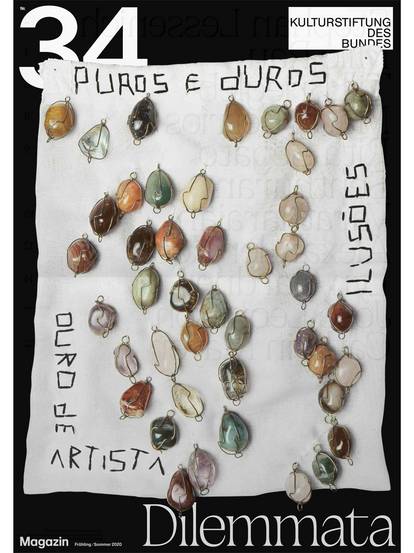


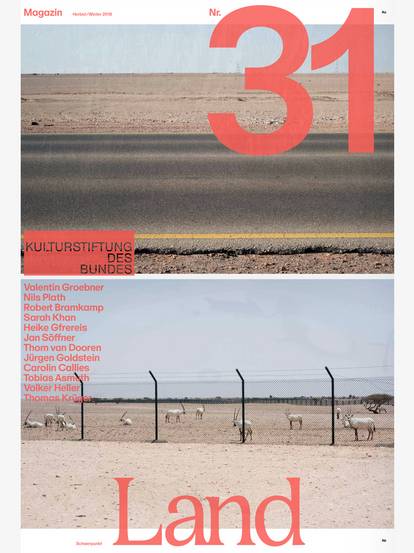
![[Translate to English:] Magazine 30](/fileadmin/_processed_/c/b/csm_magazin30_vorschau_9005f773d3.jpg)

